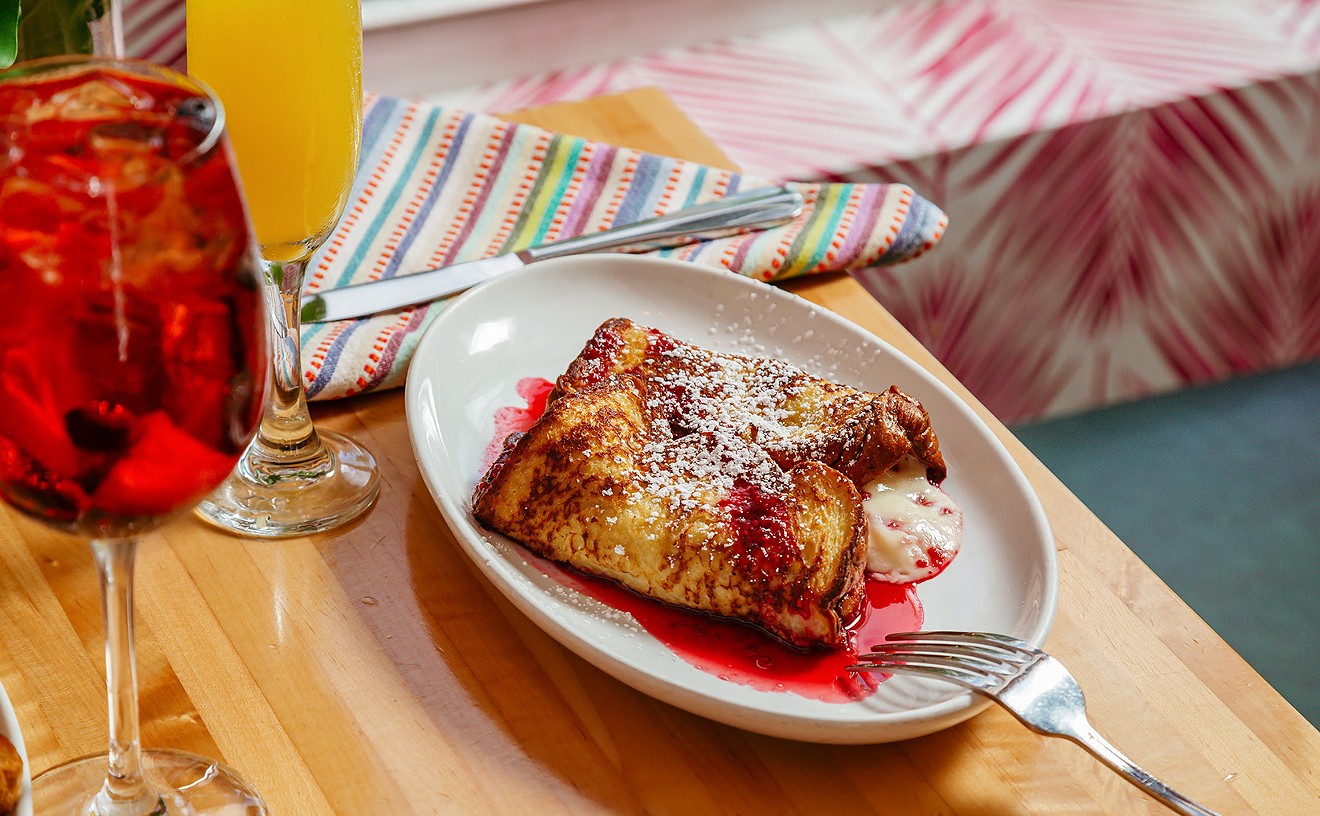Kris Wessel, a tall, lanky New Orleans native, is Miami's blue-collar superstar chef. It shows in his laid-back demeanor, hard work ethic, and no-nonsense, populist approach to dining. His acclaimed Red Light Little River was carved from a ruinous space wedged in a formerly seedy motel on a then-weedy Little River — in a neighborhood still known for the other type of red-light action (and no, we're not talking about traffic intersections). The restaurant reflects the man: Red Light resembles a working-class diner, and prices are salt-of-the-earth low — especially for a restaurant operated by a chef who just nabbed a James Beard nomination for Best Chef in the South.
Wessel chatted about a host of things while sitting at one of the restaurant's outdoor tables on a typically beautiful Miami morning. No doubt our talk set him back in his prep work — this guy really is the hardest-working chef in town — but he was gracious throughout. It seemed natural to begin the conversation with the big Beard news.
New Times: How did you find out about the nomination?
Kris Wessel: Hedy Goldsmith [currently pastry chef at Michael's Genuine], who I worked with at Mark's Place 13 years ago, texts me the other day, and it was like, 'First your Saints won, and now the Beard nomination. Congratulations.' And I'm thinking, What are you talking about? I've been so busy that I haven't absorbed it yet.
How surprised were you?
It's amazing, really... we're in the back of a motel and all. But if I think of it as an Olympic sport and degree of difficulty is involved... I've cooked out of one oven for almost two years, almost 100 seats. I have a flattop and two burners. I'm in the process of getting another four burners. So then I think, if the category is Best Chef, well, I'm maximizing the position of chef to the hilt.
Describe your food in five words.
Flavor. Soul. Unique (to Miami). Simple. Accessible.
Any ingredient you don't like working with?
I don't particularly care for tripe.
What ingredient or dish is on too many local menus?
Over the years, I've seen the gamut, from overuse of Portobello mushrooms to overuse of sesame-seared tuna to overuse of whatever the latest trend is — which is always overused, especially in this town.
A great topping for pizza?
Shredded duck, Morbier, and pear jam — which I had on the menu as a grilled cheese. I put it on a piece of flatbread the other day and kinda liked it.
After a hard day's work, you need to unwind: Pot, beer, martini, or yoga?
Oh God, I need yoga. I wish there was yoga in a cocktail — hmmm, that's a good name for a cocktail... Um, none of the above. Getting away from work is the way I unwind.
Three influences that, culinarily speaking, got you where you are today.
Growing up in New Orleans, traveling through Europe, and the lack of Miami being a real food town, which motivated me to open up Paninoteca, Liaison, and Red Light.
How important is the notion of value when dining out?
That goes back to the concept of this place. I created Red Light not to have a high degree of technique, not to be overpriced, but to be a good value across the board — wine, food, everything. That was the idea three years ago, when I was coming off working at Elia in Bal Harbour. I had this location, and it's what I thought we in the food industry should be looking at.
What was the problem with Elia?
Elia was started by a gentleman from Greece who poured a lot of money into it. He had a grand Mediterranean vision and brought in five chefs to open the restaurant, spent $2 million to build it out... it was just an ill-conceived idea from the get-go. Which we see a lot of in Miami. Like Evolution, with David Bouley — he's a fantastic chef and a fantastic restaurateur; it just didn't translate to Miami. We just saw Au Pied de Cochon spend $3 million [and close]. They have an $18 million machine in Mexico City, but what works somewhere else doesn't necessarily work in Miami. And I get tired of people thinking it does.
Where is Miami at as a food city?
I love places like Scarpetta, Eos, and Hakkasan coming in, because they're saying, "We're going to do it in Miami; we're going to give Miami this high quality and high service." But what I don't see more of are individual efforts on the smaller scale coming out of the box. Kinda like me.
Taking a gamble?
People say I rolled the dice, but I didn't roll the dice; I built this place by hand. I build the clientele, do whatever I can to survive. It was, and still is, hard work. Two years, cash-flowing it every week, no big partners — none at all in fact. I just bought out my partners. It's great.
What does Miami need to do to get more small-scale places?
More guys taking a chance. Even if it's just a sandwich shop or whatever. Break out!... I think you should train staff to run your kitchen, whether for a number of months or years, and then send them on their way. It's great for the scene and for the community. Maybe I'm a hopeless romantic.
Is it that important for chefs to have a place of their own?
Not everybody is an entrepreneur, but if you have creativity as a chef, you should find an avenue to explore it.
With the increase of high-stakes corporate-backed restaurants, those avenues can't be getting easier to find.
Yeah, in the '80s and '90s, you would have hotels open up restaurants and they wouldn't really know what to do, so they'd hire a chef to craft the cuisine. Now it's "We're putting in a SushiSamba here." So you don't have that blank slate anymore, and it's actually sad.
You went on a self-described "20-state romp" across the country with your daughters (ages 6 and 12) last summer, and you returned very high on Charleston's dining scene.
We stopped there for a night — I wish I had three — and I walked around to the James Beard-nominated restaurant Fig, three other restaurants, an oyster bar — on foot, like I was in the Village. The hospitality — and industry cohesion — was amazing. I was sitting around with some waiters, bartenders, cooks at this one place, and they were so proud of their fellow industry people: "That chef is great, and you should check this other place out." These were restaurants talking about other restaurants!
You like the food trucks going around?
I think they're great. I may do it myself. I see an oyster empanada...
Visit our food blog, Short Order, for the full two-part interview with Wessel.










